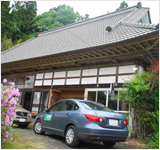Here are reports from volunteers who participated in meal preparation at Minato Primary School in Ishinomaki City.
-------------------------------------------------------------------------------------
(Mr S, Age 39, Male, Tokyo resident)
I took part in activities such as meal preparation from 30 April to 1 May. Reconstruction of the devastated area had not progressed as much as I heard about through news reports, and I felt, first hand, the misery of the disaster site with the smell of sea water sludge, washed up rubble, cars, boats, and damaged houses.
Evacuees at Minato Primary School were living with dozens of people in the confined space of one classroom, and had been continuing this sort of existence without a break for more than a month.
I felt that there is a need from now on to undertake activities such as debris removal and sewerage cleaning move towards reconstruction of the devastated area.
(Mr M, Age 37, Male, Kanagawa prefecture resident)
Although initially before participating I was unsure if there would be anything I could do to help, but I realised that there are many activities I could be part of.
When I saw the vicinity of Minato Primary School, the area towards Ishinomaki port, and the areas where there was greatest tsunami damage, I felt that even just taking the first step to actually visit the disaster site was significant and would lead to providing practical support. I witnessed situations too dreadful to put into words, which gave me a shock and at the same time made me realise the significance of our daily support activities as well as the significance of what was lost.
However, according to stories I have heard from grandparents since I was a child, the circumstances during postwar days were just as devastating, following which Japan was able to recover, which is why today's society exists. Up until now we have been receiving the fruit of our predecessors efforts for revival, but now, we, as the people concerned must strive for revival.
(Mr T, Age 45, Male, Tokyo resident)
I felt that the town was divided by the disparity between the areas that received enormous damage and those areas where damage was slight. While in the former, people gather for meals prepared by volunteers, in the latter they go shopping at supermarkets. In addition, even within those areas where damage was great, when I spoke to people from the site, I felt that there is an emerging gap between those people who lost their houses and those who didn't.
-------------------------------------------------------------------------------------
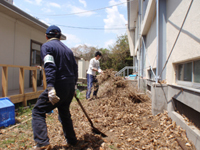 I heard from someone in the evacuation centre that during the immediate aftermath of the disaster, relief supplies couldn't get through, so island residents themselves brought food and petrol, and divided the provisions among themselves to support each other. In addition, elderly women who no longer routinely helped with fishing started to assist in attaching seed oysters once again. Irrespective of age and gender, the effort that people are making to become independent is very tangible. The island residents have such willingness to cooperate, and when they spoke words of appreciation, and chatted with us, we felt encouraged and inspired to work hard.
I heard from someone in the evacuation centre that during the immediate aftermath of the disaster, relief supplies couldn't get through, so island residents themselves brought food and petrol, and divided the provisions among themselves to support each other. In addition, elderly women who no longer routinely helped with fishing started to assist in attaching seed oysters once again. Irrespective of age and gender, the effort that people are making to become independent is very tangible. The island residents have such willingness to cooperate, and when they spoke words of appreciation, and chatted with us, we felt encouraged and inspired to work hard. 










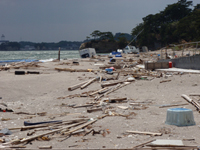 Katsurajima is a small island with an area of 6ha, circumference of about 2km, and approximately 240 residents,
Katsurajima is a small island with an area of 6ha, circumference of about 2km, and approximately 240 residents,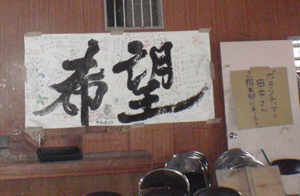 Since the immediate aftermath of the earthquake disaster of 11 March, I had been continually preoccupied with the thought that I should do something to help the devastated area, and therefore decided to participate in this volunteer activity.
Since the immediate aftermath of the earthquake disaster of 11 March, I had been continually preoccupied with the thought that I should do something to help the devastated area, and therefore decided to participate in this volunteer activity.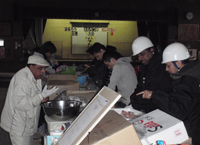 Although my schedule was for a limited time, I participated in meal preparation. I saw before my eyes that the people who had evacuated there had lost their loved ones, homes, familiar communities, and were in extremely distressful, awful circumstances. It is certain that much more support is still needed, and it is important for there to be a system of emergency relief to support today's life, and tomorrow's life, through Japanese and foreign people coming together as one. However, at the same time, when I recall the proud character of friends and acquaintances from Tohoku I feel anxious about what lies ahead. What I feel most is that while retaining the dignity they originally possess, perhaps the time has come for these victims to work towards becoming independent. In order for them to regain a life with a purpose while doing something worthwhile, I would like to find something I can do to help.
Although my schedule was for a limited time, I participated in meal preparation. I saw before my eyes that the people who had evacuated there had lost their loved ones, homes, familiar communities, and were in extremely distressful, awful circumstances. It is certain that much more support is still needed, and it is important for there to be a system of emergency relief to support today's life, and tomorrow's life, through Japanese and foreign people coming together as one. However, at the same time, when I recall the proud character of friends and acquaintances from Tohoku I feel anxious about what lies ahead. What I feel most is that while retaining the dignity they originally possess, perhaps the time has come for these victims to work towards becoming independent. In order for them to regain a life with a purpose while doing something worthwhile, I would like to find something I can do to help. As my house is covered with mud, I must clean the mess from half past four every morning. Cleaning takes ages as there is no water supply. I cannot even wash myself when I get sweaty.
As my house is covered with mud, I must clean the mess from half past four every morning. Cleaning takes ages as there is no water supply. I cannot even wash myself when I get sweaty. 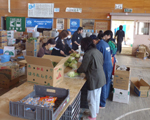 (Male evacuee, Age around 70) Recorded on 17th April, 2011
(Male evacuee, Age around 70) Recorded on 17th April, 2011